In a stirring defence of India’s secular promise, the Madras High Court called out the State for denying a Hindu resident permission to hold an Annadhanam—a community meal—on a public ground in a Christian-majority village, warning that public spaces cannot become the preserve of any one faith.
Justice GR Swaminathan, delivering the order from the Madurai Bench, was unambiguous: “If a public ground belongs to the government, it must be open to all. Excluding anyone purely on religious grounds strikes at the heart of Article 15 of the Constitution.”
The dispute began when the local Tahsildar refused permission for K. Rajamani, a Hindu villager, to distribute food near the Kaliyamman temple during its Kumbabisekam ritual, citing fears of unrest. The site, the officer claimed, had been used exclusively by Christians for over a century.
Justice Swaminathan was unimpressed by that reasoning. “Our Constitution came into force in 1950. No pre-Constitution arrangement that violates its spirit can survive,” he said, dismissing claims of a 1912 agreement restricting the ground’s use to Christians.
The Court made a fine distinction: Christians could rightfully use the space for Easter celebrations, but denying Hindus access at any other time was unconstitutional. “If the Annadhanam is on a day when the ground lies unused, whose rights are being violated?” the judge asked pointedly.
He set aside the Tahsildar’s October 24 order, allowing Rajamani to proceed with the food distribution. Drawing parallels with an earlier decision that permitted a Bible study centre despite law-and-order concerns, Justice Swaminathan noted, “Apprehensions cannot override the freedoms guaranteed under Articles 25 and 26.”
Yet beyond law, the judgment struck an emotional chord. Calling the situation “a sorry state of affairs,” the judge lamented the growing religious distance even within shared communities. “In every religious celebration, others must join in spirit. When a Christian friend celebrates Christmas, I should greet him first,” he said.
Recalling a personal memory that underscored this ethos, Justice Swaminathan shared, “A Muslim friend once made only vegetarian Nonbu Kanji during Ramzan so that I could partake. Such gestures capture the beauty of our culture.”
He concluded with a quiet warning—harmony, if not lived, cannot be legislated: “Unless we embody this cultural unity in everyday life, peace will remain a fragile idea.”





